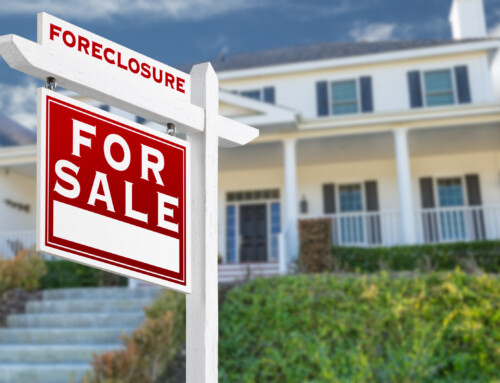BUYING A FIXER-UPPER | THE FOOL PROOF WAY TO FLIPPING HOUSES
Buying a fixer-upper can be a fantastic opportunity to build wealth in real estate. Finding them in today’s market can be challenging, but definitely worth pursuing. Let’s take a deeper dive before you call yourself the next Chip & Joanna Gaines.
FOR YOURSELF OR AN INVESTMENT?
First, you need to ask yourself if this is going to be your primary residence or an investment property for a quick flip or rental. The reason being is that the numbers and formulas will be wildly different from each other depending on the intent you have for the property. What you can make work as a homeowner for your primary residence, won’t be the same for what you can make work for an investment property.
GREAT WAY TO BUILD EQUITY
Buying a house that has been neglected and needs some work can give you some great equity. If you get it for the right price of course. Once you finish rehabbing the house, the value will increase substantially. But remember this, you make your money when you buy.
Let’s run a very basic example with some numbers:
- You buy the house at $200,000
- Repairs cost around $50,000
- Fully updated the house is worth $300,000
- Your equity: $50,000
Of course this is much easier said than done and it’s much more complicated than this. But we are just keeping it simple for now.
WHY YOU SHOULD BUY ONE
If you plan on this house being the one you live in, then this is the best way to go in my opinion. In addition to the equity possibility, like the example above, you also get to choose all of your finishes. You basically get a blank slate and get to be your own designer!
If you purchased a move-in ready home, you are going to pay top dollar for it. If you go the fixer-upper route, you can get a pretty nice deal when the market isn’t so hot. You could pick up property for pennies on the dollar and create your own wealth. Buying a move-in ready home, you are buying 100% top of market value at that given moment.
If you love having projects to complete around the house to make it your own, then a fixer-upper is for you!
WHY YOU SHOULDN’T BUY ONE
If you think this is some “get rich quick” kind of scheme, you should just stay out of it. Too many times we talk with people who have paid thousands of dollars for a seminar that’s full of fluff, things that just aren’t practical anymore, or they just beat around the bush and never really get to the meat and potatoes of how to flip a property successfully. Although you can make a lot of money flipping houses or creating wealth through equity, this isn’t a way to make millions of dollars in 30 days or less.
If you are afraid of work or don’t want to consider remodeling, then buying a fixer-upper is not your thing. You should look into buying move-in ready homes that meet your standards.
Risk vs. reward. If you are okay with taking a risk on a house to flip or chancing the market conditions, then go for it. But if you are more interested in a little to no risk investment, consider move-in ready homes for sale in Houston.
LET’S REVIEW THE PRO’S AND CON’S OF PURCHASING A FIXER-UPPER IN HOUSTON
Pros:
- Lower purchase price compared to similar homes in the area
- Increase value by renovations
- Creating equity you wouldn’t have had
- You control how the house looks, customized to your taste
Cons:
- It takes work and patience
- If flipping, you risk losing money
- Renovations can cost more than you anticipate
- Takes longer than expected
If the reward outweighs the risk, then go for it! And if this is too risky for you, then let’s find you something move-in ready with less of a risk.
BUYING A FIXER-UPPER THE SMART WAY
HOW TO FIND THEM
MLS
There are multiple ways to find a fixer-upper. Our personal favorite is the MLS, or property that is on the market.
When we flip houses, we go after homes in price ranges most people are not looking in. Most people are chasing the $100,000 – $200,000 homes and competition is steep, which means most people end up over paying for the property just to secure it and in return make very little to no money when they sell because they are over budget. When you start getting to the $300,000 – $500,000 range, there isn’t much competition. Which means you have a little more time to think and properly assess the property and the estimated costs that will come with it.
We have saved searches set up, so it does most of the heavy lifting for us. Should a property come on the market that matches our criteria, we will be notified right away. And sometimes, you have to make something out of nothing. You may find a home that needs some work that has been sitting on the market for a really long time. In this circumstance, you can offer the sellers an amount that would work for you to flip the property, maybe even an amount that is substantially lower than their list price. Our biggest deals ever came from doing this.
So, regardless of what those seminar gurus tell you, the MLS, in our opinion, is the best option. And if this is something that interests you, contact us and we can get you set up on your own saved search for potential investment properties.
WHOLESALERS & OTHER INVESTORS
Next, we have wholesalers and other investors.
If you don’t know what a wholesaler is, it is someone who finds distressed properties and gets them under contract with the seller for a certain sales price, but adds their own “commission” on top and then offers the contract at the new sales price to other investors. Because of this, they take most of the profit from the deal when they add their take on top. It’s important to take whatever a wholesaler says with a grain of salt. But, I will say, every now and then a good deal does come across my desk from a wholesaler. So, don’t totally disregard them and make sure you do your own research on the deals they send you.
When it comes to other investors, they may have deals they need to unload. Maybe they are strapped for cash, maybe they took on too big of a project or maybe they just can’t handle more than they already have going on. So make friends with other investors if you can, they can be a resource to you.
DRIVING FOR DOLLARS
This method is extremely time consuming, but can create a deal or two for you. Have you ever driven by a house and thought to yourself, “dang that house looks abandoned?” Well, chances are it is. Write down the address and track down the current owner to find out if they are interested in selling. I wouldn’t recommend doing this all day every day, but just when you are out and about running errands.
OTHER METHODS
There are many other ways you can find a fixer-upper, but I won’t go into a lot of detail here. Some other ways you can find investment properties are pre-foreclosures, foreclosures or REOs, short sales, bandit signs, and auctions.
If you would like more information on any of these ways to acquire property, please feel free to reach out and we can give you all the information you need.
BE REALISTIC ABOUT PRICE & YOUR SKILLS
When you find a house that you think you are interested in, be realistic on price. Gauge the circumstances before you make an offer. Understand key metrics to determine your starting price. How long have they been on the market? Is it a bank owned property? Was the house probated? What is the condition of the home compared to what you need it to be to sell? Just because a house has been on the market a long time, doesn’t mean they are going to accept your offer $100,000 below their asking price. So be prepared to get rejected quite a bit before someone accepts your offer and don’t get too emotionally attached.
When it comes to the condition and how much you should repair/remodel, know your skills and what you are capable of. If you know the project is too big for you to handle, start with something smaller that doesn’t require a full blown rehab.
LINE UP FINANCING
Are you financing the purchase or paying cash? If you are financing the house, then you need to get financing lined up before you start shopping. If the condition of the home is super rough, it may not qualify for traditional financing, so you may need to get with a hard money lender. If the house is habitable, you may be able to finance the house using traditional loans. Talk with a lender and see if they think the house will qualify.
FIND RELIABLE CONTRACTORS
This is probably the hardest thing to do! Seriously. Contractors can make or break you. And bad ones are EVERYWHERE. My advice, start by getting recommendations from your friends, family, colleagues, and real estate agent before you start googling people to work with. Talk with any investor and they will have plenty of horror stories to tell you about their shortcomings with contractors. Be extremely cautious on who you choose and don’t always take the lowest bid. Also, if it’s your first time and you know nothing about construction, find a contractor who has the capability and employees to do most of the work, if not all. When you gain experience you can hire your own subs to save money.
LOOK FOR THE RIGHT RENOVATIONS
Every house doesn’t warrant a full remodel or any rehab for that matter. Just because the kitchen has ugly cabinets doesn’t mean if you paint them you can sell the house for $50,000 more than you bought it for. Well, I guess you could depending on what price you bought it for. But if you are looking to lowball and do a full blown rehab, then you need to find a house that looks rough on the inside. If you ever looked at property for sale online you know what I’m talking about. You are looking for houses that haven’t been updated since it was built, houses that have been neglected or severely damaged from the previous owners. If the pictures make you say “EWW”, then you are on the right track.
GET ESTIMATES BEFORE MAKING A DECISION – IF YOU HAVE TIME
If you found the one you want to make an offer on, you should probably bring your contractor along and get some ballpark estimates before making an offer. If there are a million cars lined up outside trying to look at the house, then you may not have any time to get estimates. This is where experience comes into play. The more knowledge you have with remodeling, you will start to get a feel for how much things cost with the contractors you use. If you somehow got an offer accepted with an option period, that’s when you can get your contractor out there to run estimates for you. At least you can protect yourself and back out or re-negotiate if their numbers didn’t match anything close to what you thought.
KNOW WHEN TO WALK AWAY
Every deal isn’t worth going for. Know when to walk away. Don’t let emotions cloud your judgement. If the numbers don’t work, don’t force it. That’s a surefire way to lose everything you have. And if the remodel is more than you are comfortable with, like I said earlier, find something smaller that you can handle.
FINAL WORD
Buying fixer-uppers is an excellent way to invest in real estate. I hope you can find success in this industry if it is something that interests you. Take our advice and do with it what you will. We flip a dozen houses a year and wanted to write this article to help anyone out there who is thinking about jumping in. Reach out to us if you have any questions, we are here to help.
If you found this article helpful, share it on social media with your friends and family, maybe it could help someone else too!











